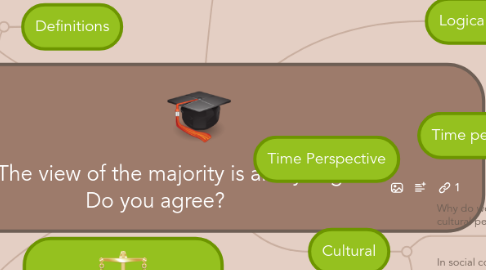"The view of the majority is always right." Do you agree?
by Nurulhuda Hassan


1. Stand
1.1. No, I do not agree.
2. Definitions
2.1. Majority
2.1.1. The greater number: "in the majority of cases"; "a majority decision".
2.2. Right
2.2.1. Morally good, justified, or acceptable.
3. THESIS STATEMENT
3.1. AGREE
3.1.1. Consequentialist ethics asserts that what is ethically right is simply that which secures the maximum happiness (utility) for the greatest number of people.
3.2. DISAGREE
4. Time perspective
4.1. Historical perspective leads us to find an example of where the view of the majority led to the suffering of the minority.
4.1.1. The lynching mobs that were dominant in the early 20th century throughout southern US states such as Mississippi shows that although the Whites were the majority, their views may not always be right. Many Black people were lynched and killed just because the Whites were racial supremacists.
5. Cultural
5.1. Why do we need to consider cultural perspective?
5.1.1. Ignoring the minority views and opinions is a sign of disrespect to the minority cultures.
